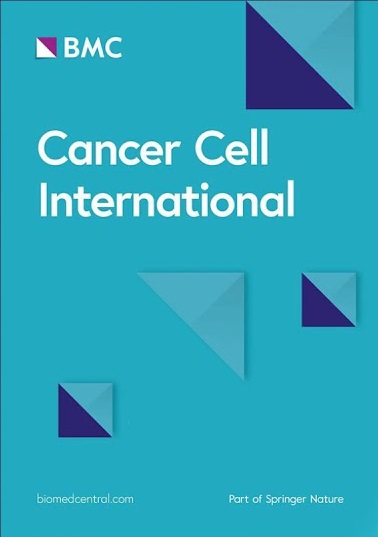Exosome-mediated transfer of lncRNA RP3-340B19.3 promotes the progression of breast cancer by sponging miR-4510/MORC4 axis
IF 5.3
2区 医学
Q1 ONCOLOGY
引用次数: 0
Abstract
This study aims to explore the molecular mechanism of lncRNA RP3-340B19.3 on breast cancer cell proliferation and metastasis and clinical significance of lncRNA RP3-340B19.3 for breast cancer. The subcellular localization of lncRNA RP3-340B19.3 was identified using RNA fluorescence in situ hybridization (FISH). The expression of lncRNA RP3-340B19.3 in breast cancer cells, breast cancer tissues, as well as the serum and serum exosomes of breast cancer patients, was measured through quantitative RT-PCR. In the in vitro setting, we conducted experiments to observe the effects of RP3-340B19.3 on both cell migration and proliferation. This was achieved through the utilization of transwell migration assays as well as clone formation assays. Meanwhile, transwell migration assays and clone formation assays were used to observe the effects of MDA-MB-231-exosomes enriched in RP3-340B19.3 on breast cancer microenvironment cells MCF7 and BMMSCs. Additionally, western blotting techniques were used to assess the expression levels of proteins associated with essential cellular processes such as proliferation, apoptosis, and metastasis. In vivo, the impact of RP3-340B19.3 knockdown on tumour weight and volume was observed within a nude mice model. We aimed to delve into the intricate molecular mechanisms involving RP3-340B19.3 by using bioinformatics analysis, dual luciferase reporter gene experiments and western blotting. Moreover, the potential correlations between RP3-340B19.3 expression and various clinical pathological characteristics were analyzed. Our investigation revealed that RP3-340B19.3 was expressed in both the cytoplasm and nucleus, with a noteworthy increase in breast cancer cells. Notably, we found that RP3-340B19.3 exerted a promoting influence on the proliferation and migration of breast cancer cells, both in vitro and in vivo. MDA-MB-231-exosomes enriched in RP3-340B19.3 promoted the proliferation and migration of MCF7 and BMMSCs in vitro. Mechanistically, RP3-340B19.3 demonstrated the capability to modulate the expression of MORC4 by forming a complex with miR-4510. This interaction subsequently triggered the activation of the NF-κB and Wnt-β-catenin signaling pathways. Furthermore, our study highlighted the potential diagnostic utility of RP3-340B19.3. We discovered its presence in the serum and exosomes of breast cancer patients, showing promising efficacy as a diagnostic marker. Notably, the diagnostic potential of RP3-340B19.3 was particularly significant in relation to distinguishing between different pathological types of breast cancer and correlating with tumour diameter. Our findings establish that RP3-340B19.3 plays a pivotal role in driving the proliferation and metastasis of breast cancer. Additionally, exosomes enriched in RP3-340B19.3 could influence MCF7 and BMMSCs in tumour microenvironment, promoting the progression of breast cancer. This discovery positions RP3-340B19.3 as a prospective novel candidate for a tumour marker, offering substantial potential in the realms of breast cancer diagnosis and treatment strategies.外泌体介导的lncRNA RP3-340B19.3通过疏导miR-4510/MORC4轴促进乳腺癌的进展
本研究旨在探讨lncRNA RP3-340B19.3对乳腺癌细胞增殖和转移的分子机制,以及lncRNA RP3-340B19.3对乳腺癌的临床意义。利用RNA荧光原位杂交(FISH)技术确定了lncRNA RP3-340B19.3的亚细胞定位。通过RT-PCR定量检测了lncRNA RP3-340B19.3在乳腺癌细胞、乳腺癌组织以及乳腺癌患者血清和血清外泌体中的表达。在体外实验中,我们观察了 RP3-340B19.3 对细胞迁移和增殖的影响。这是通过使用经孔迁移试验和克隆形成试验来实现的。同时,还使用了经孔迁移试验和克隆形成试验来观察富含 RP3-340B19.3 的 MDA-MB-231 外泌体对乳腺癌微环境细胞 MCF7 和 BMMSCs 的影响。此外,还使用了 Western 印迹技术来评估与增殖、凋亡和转移等重要细胞过程相关的蛋白质的表达水平。在裸鼠模型中,我们观察了 RP3-340B19.3 基因敲除对肿瘤重量和体积的影响。我们的目的是通过生物信息学分析、双荧光素酶报告基因实验和 Western 印迹法,深入研究涉及 RP3-340B19.3 的复杂分子机制。此外,我们还分析了RP3-340B19.3的表达与各种临床病理特征之间的潜在相关性。我们的研究发现,RP3-340B19.3 在细胞质和细胞核中均有表达,在乳腺癌细胞中的表达量显著增加。值得注意的是,我们发现 RP3-340B19.3 在体外和体内都对乳腺癌细胞的增殖和迁移有促进作用。富含 RP3-340B19.3 的 MDA-MB-231 外泌体在体外促进了 MCF7 和 BMMSCs 的增殖和迁移。从机理上讲,RP3-340B19.3 能通过与 miR-4510 形成复合物来调节 MORC4 的表达。这种相互作用随后引发了 NF-κB 和 Wnt-β-catenin 信号通路的激活。此外,我们的研究还强调了 RP3-340B19.3 的潜在诊断作用。我们发现它存在于乳腺癌患者的血清和外泌体中,显示出作为诊断标记物的良好疗效。值得注意的是,RP3-340B19.3 的诊断潜力在区分不同病理类型的乳腺癌以及与肿瘤直径相关方面尤为显著。我们的研究结果表明,RP3-340B19.3 在乳腺癌的扩散和转移过程中起着关键作用。此外,富含 RP3-340B19.3 的外泌体可影响肿瘤微环境中的 MCF7 和 BMMSC,促进乳腺癌的进展。这一发现将 RP3-340B19.3 定位为肿瘤标志物的潜在新候选者,为乳腺癌诊断和治疗策略提供了巨大的潜力。
本文章由计算机程序翻译,如有差异,请以英文原文为准。
求助全文
约1分钟内获得全文
求助全文
来源期刊

Cancer Cell International
ONCOLOGY-
CiteScore
10.90
自引率
1.70%
发文量
360
审稿时长
1 months
期刊介绍:
Cancer Cell International publishes articles on all aspects of cancer cell biology, originating largely from, but not limited to, work using cell culture techniques.
The journal focuses on novel cancer studies reporting data from biological experiments performed on cells grown in vitro, in two- or three-dimensional systems, and/or in vivo (animal experiments). These types of experiments have provided crucial data in many fields, from cell proliferation and transformation, to epithelial-mesenchymal interaction, to apoptosis, and host immune response to tumors.
Cancer Cell International also considers articles that focus on novel technologies or novel pathways in molecular analysis and on epidemiological studies that may affect patient care, as well as articles reporting translational cancer research studies where in vitro discoveries are bridged to the clinic. As such, the journal is interested in laboratory and animal studies reporting on novel biomarkers of tumor progression and response to therapy and on their applicability to human cancers.
 求助内容:
求助内容: 应助结果提醒方式:
应助结果提醒方式:


